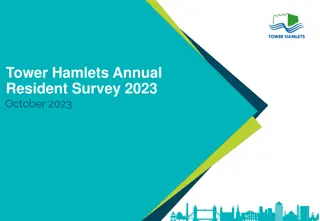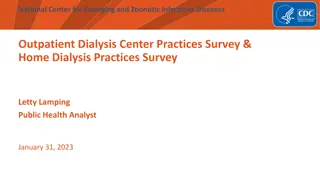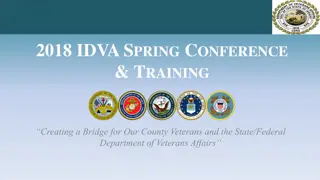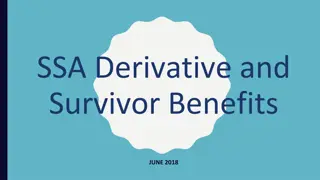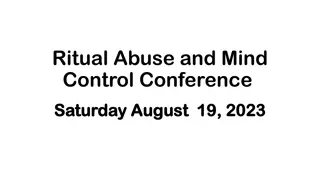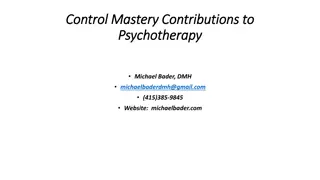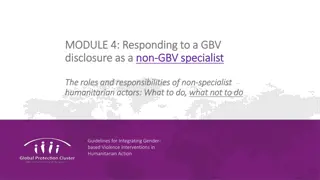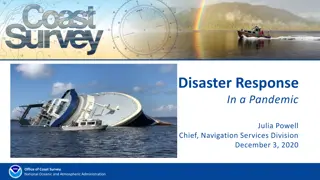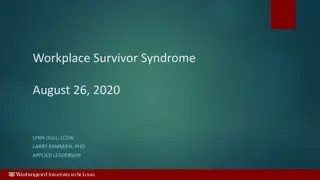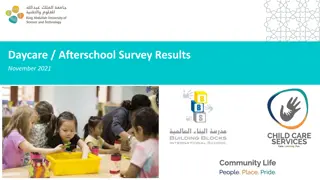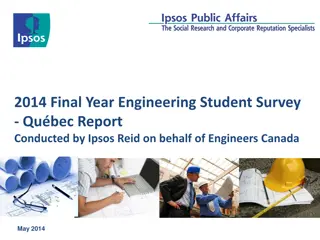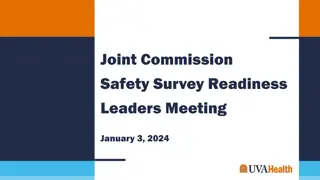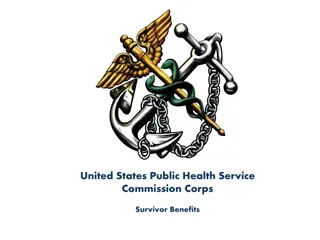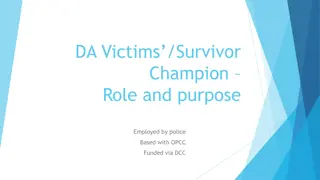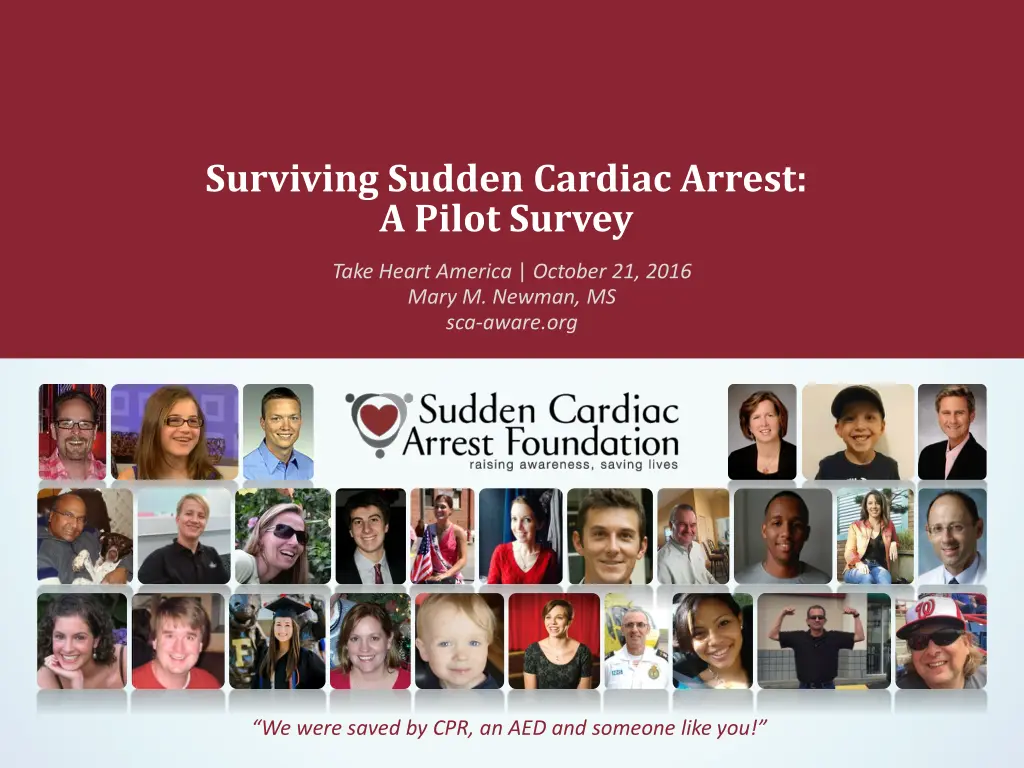
Understanding Cardiac Arrest Survivors' Psychosocial Perceptions
Explore the psychological challenges faced by cardiac arrest survivors through a qualitative research study, discovering high rates of anxiety, depression, and PTSD. This survey aims to identify unique themes crucial for developing patient-centered interventions and resources to support survivors and their loved ones.
Download Presentation

Please find below an Image/Link to download the presentation.
The content on the website is provided AS IS for your information and personal use only. It may not be sold, licensed, or shared on other websites without obtaining consent from the author. If you encounter any issues during the download, it is possible that the publisher has removed the file from their server.
You are allowed to download the files provided on this website for personal or commercial use, subject to the condition that they are used lawfully. All files are the property of their respective owners.
The content on the website is provided AS IS for your information and personal use only. It may not be sold, licensed, or shared on other websites without obtaining consent from the author.
E N D
Presentation Transcript
Surviving Sudden Cardiac Arrest: A Pilot Survey Take Heart America | October 21, 2016 Mary M. Newman, MS sca-aware.org We were saved by CPR, an AED and someone like you!
Surviving Sudden Cardiac Arrest: A Pilot Qualitative Survey Study of Survivors Kelly N. Sawyer, MD, MS,1 Frances Brown, PsyD, LP,2 Roxanne Christensen, MA, TLLP,2 Colleen Damino, PsyD,2 Mary M. Newman, MS,3 and Michael C. Kurz, MD, MS-HES4 1 Department of Emergency Medicine, Beaumont Health System, Royal Oak, MI; 2Michigan School of Professional Psychology, Farmington Hills, MI; 3Sudden Cardiac Arrest Foundation, Pittsburgh, PA; 4Department of Emergency Medicine, University of Alabama School of Medicine, Birmingham, AL Therapeutic Hypothermia and Temperature Management Volume 6, Number 2, 2016
Introduction Rates of survival from out-of-hospital cardiac arrest vary and depend on: Strength of links in Chain of Survival, including CPR and defibrillation Geographical/ temporal circumstances Comprehensive post-arrest critical care, including therapeutic hypothermia Few guidelines and resources to help survivors and friends and family members (FFMs) post- resuscitation
Contemporary Research Focus Functional ability Perceived quality of life Cognitive or neuropsychiatric measures Study limitations Small sample sizes Different methodologies Conflicting results Related literature explores emotional and psychological issues among patients with ICDs
Contemporary Research Literature review found high incidence of psychological distress in cardiac arrest survivors Anxiety 13-61% Depression 14-45% PTSD 19-27% Recommendation Psychological screening Early intervention Further research
Research Gaps Understanding survivors psychosocial perceptions of life in the aftermath of cardiac arrest is the first step to development of interventions and resources that meet the needs of survivors their loved ones and the larger support system.
Objective of Our Study Identify themes unique and important to cardiac arrest survivors, family members and friends Results may serve as basis for future patient- centered focus groups and development of patient- centered interventions and resources
Methodology Internet-based survey of SCA FDN members conducted among survivors and friends/ family members (FFM), July-November 2013 Use of discrete multiple choice questions and open- ended questions Independent researchers conducted inductive thematic analyses using accepted qualitative research methods Data divided and reviewed independently to ensure inter-rater reliability Key story elements organized into global and major themes No statistical inferences made
Results 1,060 members contacted 30% opened e-mail; 15% clicked survey link 196 members (157 survivors and 39 FFMs) completed surveys (18.5% response rate)
Characteristics of Survivors Age at Time of Study 81+ 1% 18-40 18% 61-80 21% 41-60 60%
Characteristics of Survivors Location of Arrest Hospital 10% Home 33% Public place 57%
Characteristics of Survivors Therapeutic Hypothermia Provided Don't know 12% Yes 35% No 53%
Characteristics of Survivors Received an ICD No 31% Yes 69%
Characteristics of Survivors Discharge Location Rehab 5% Home 95%
Characteristics of Survivors Back to Work/ School No 14% Yes, with limitations 25% Yes, no limitations 69%
Characteristics of Survivors Memory Issues Memory loss near time of arrest: 75% Remembered being in hospital: 58% Remembered discharge from hospital: 79% Daily problems with memory after discharge: 22%
Characteristics of Survivors Discharge counseling Who provided counseling? Doctor (65%) Nurse (24%) Other/ unknown (14%)
Characteristics of Survivors Discharge counseling Advice Expect possible emotional, psychological and memory difficulties at home. (5%) I don t remember/ don t know. (12%) I was told nothing. (19%) Take it easy. (54%) Take it easy.
Characteristics of Survivors Biggest Challenges (%) 55 41 39 36 33 29 27 14 12 11 7 6
Survivor Themes Global Themes Major Themes Significance of others We are in this together. Too many feelings Seeking a new normal Desire to locate and share with others with similar experiences Subculture identification (different from heart attack) Mental health: anxiety, depression, helplessness, loss of identity, existential concerns Financial concerns Lack of preparation for emotional/cognitive changes Changed relationships
Survivor Quotes I want to talk about it but no one wants to or understands why. Anxiety and depression don t just go away because you re happy you survived. People act as if they knew what was best for me People treat me as if I would die at any minute.
The Most Neglected Survivors? Those deemed highly functioning after cardiac arrest are more likely to deceive providers and acquaintances because they look and act neurologically intact before hospital discharge. This subset may be most neglected with regard to resources provided at discharge.
Friends/ Family Member Themes Global Themes Major Themes Memory loss around and after event No information on what to expect after discharge; follow-up appointments centered on cardiology Peer support would be helpful What to expect going forward Lack of information at discharge Lack of mental health resources What if it happens again?
Family Member/ Friend Quotes It s not the same as a heart attack. There was a lack of information at discharge. How common is this? I wish I had known What if it happens again? He is still experiencing memory loss. I m afraid of leaving him alone. I received no mental health resources. I have to make sure this doesn t happen again.
Family Member/ Friend Quotes It would have been helpful to connect with someone who has gone through it, not just a doctor, nurse or social worker.
Limitations Self-selected sample of respondents with Internet access and functional ability to complete survey May not be representative of population at large Relatively low response rate (18.5%) No statistical inferences made However Goal to identify themes for further qualitative research Larger studies with multiple survey methods may be warranted
Conclusions Research informs clinicians and researchers on complexity of survival and themes important to survivors and FFMs Use of open-ended questions and thematic analysis provided room for honesty about thoughts and feelings Themes should be used to explore survivors perceptions and needs and spur development of resources for survivors and FFMs.
Discussion This qualitative pilot study takes a necessary step in assessing how patients experience life after survival and also provides insights on experiences of FFMs There is a need for support networks and social media groups with expertise from people who are trained in supportive care of others
Recommendations Develop a system for discharge counseling that includes: Follow-up and expert re-evaluation Reiteration of instructions, expectations and resources for survivors Provide resources for survivors and FFM including options for peer support
Sudden Cardiac Arrest Network The Sudden Cardiac Arrest Network provides peer support, opportunities to participate in discussion groups, research, blogging, and more. Visit www.sca-aware.org for more information. And visit us on Facebook and Twitter.

